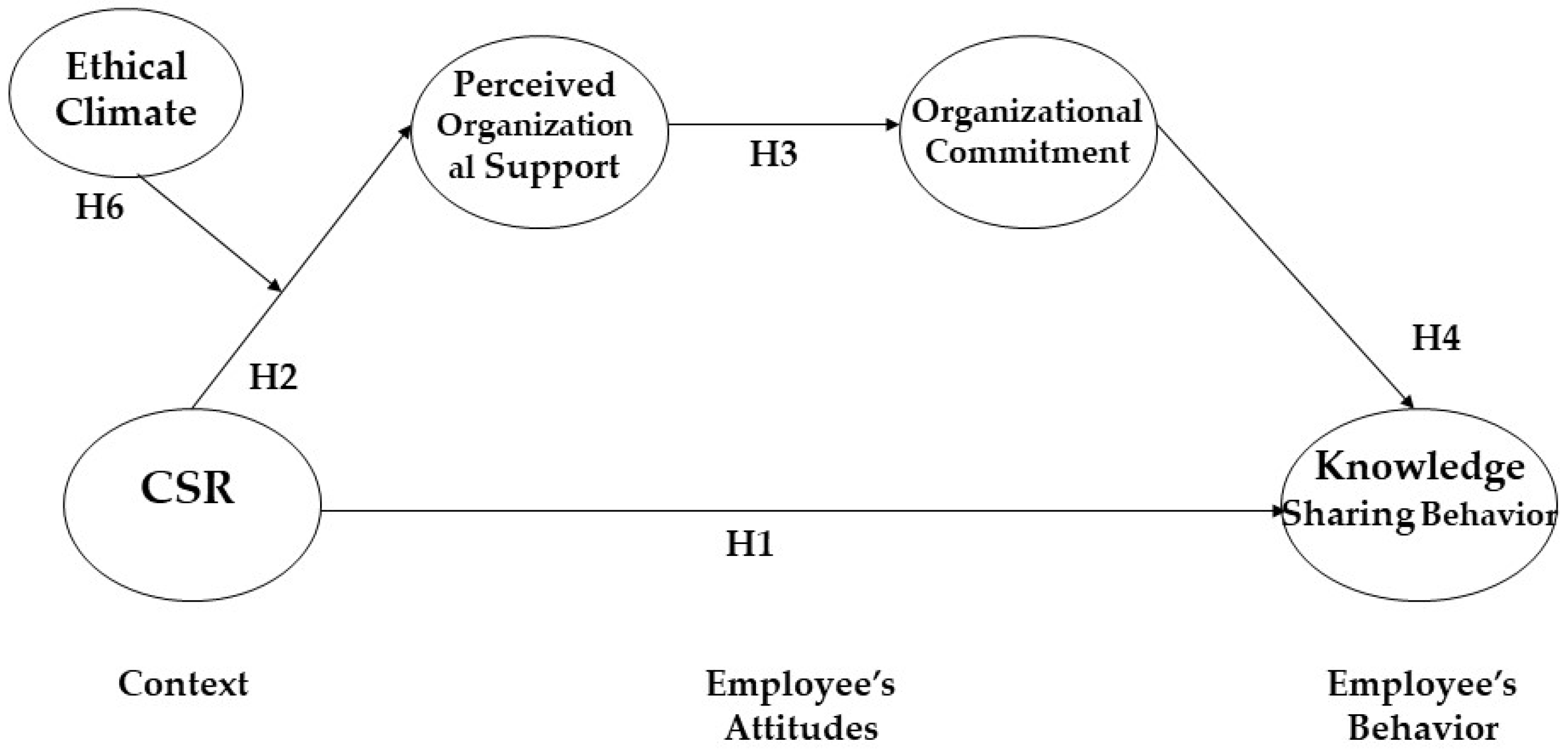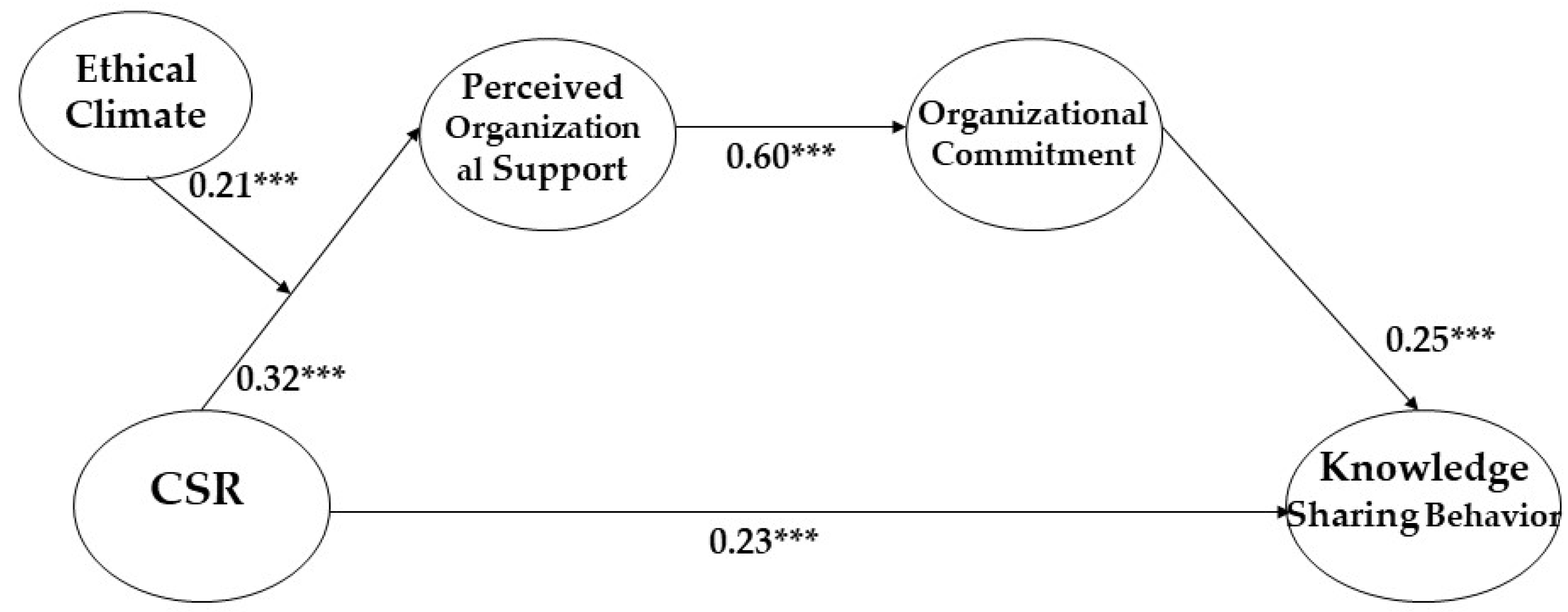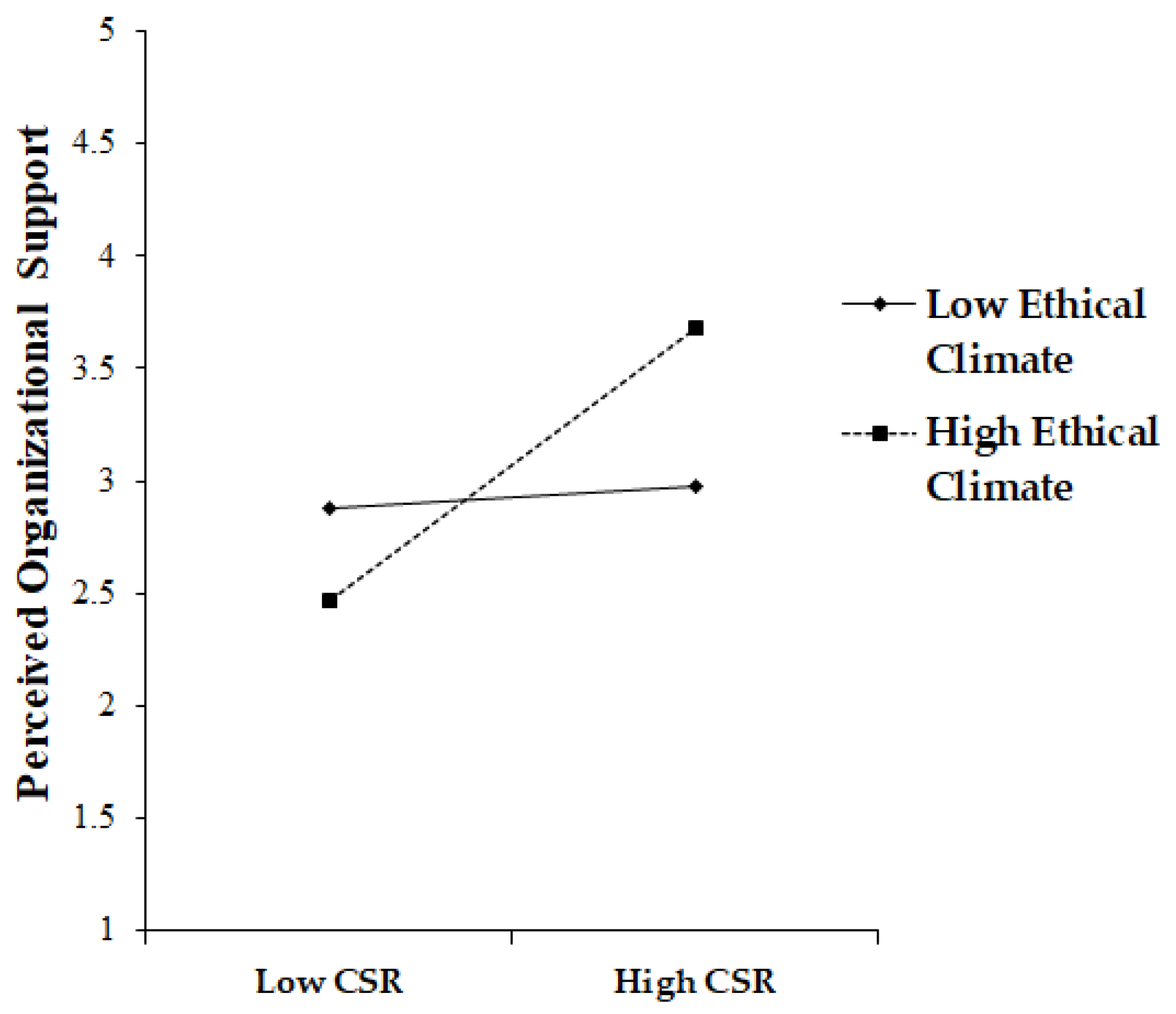Submitted:
28 June 2023
Posted:
29 June 2023
You are already at the latest version
Abstract
Keywords:
1. Introduction
2. Theory and Hypotheses
2.1. CSR and Knowledge-sharing Behavior
2.2. CSR and POS
2.3. POS and Organizational Commitment
2.4. Organizational Commitment and Knowledge-sharing Behavior
2.5. Sequential Mediation of POS and Organizational Commitment in the Link Between CSR and Knowledge-sharing Behavior
2.6. Moderation of Ethical Climate in the Link Between CSR and POS
3. Research Methodology
3.1. Participants and Procedure
3.2. Measures
3.2.1. CSR (Gathered at Time Point 1, Gathered from Employees)
3.2.2. Ethical Climate (Time Point 1, Gathered from Employees)
3.2.3. POS (Time Point 2, Gathered from Employees)
3.2.4. Organizational Commitment (Time Point 2, Gathered from Employees)
3.2.5. Knowledge-sharing Behavior (Time Point 3, Gathered from Employees’ Direct Supervisors)
3.2.6. Control Variables (Time Point 2, Gathered from Members in an Organization)
3.3. Analytical Approach
4. Results
4.1. Descriptive Statistics
4.2. Measurement Model
4.3. Structural Model
4.3.1. The Results of Mediation Analysis
4.3.2. The Result of Moderation Analysis
4.4. Bootstrapping
5. Discussion
5.1. Theoretical Implications
5.2. Practical Implications
5.3. Limitations and Suggestions for Future Studies
6. Conclusions
Author Contributions
Funding
Conflicts of Interest
References
- Aguinis, H.; Glavas, A. What we know and don’t know about corporate social responsibility: A review and research agenda. J. Manage. 2012, 38, 932–968. [Google Scholar] [CrossRef]
- Banker, R.D.; Ma, X.; Pomare, C.; Zhang, Y. When doing good for society is good for shareholders: Importance of alignment between strategy and CSR performance. Review of Accounting Studies 2022. [Google Scholar] [CrossRef]
- Cunningham, P. Corporate social responsibility in small- and medium-sized fast-growth private firms: How is CSR conceived, enacted, and communicated? In The Routledge Handbook of Corporate Social Responsibility Communication; O’Connor, A., Ed.; Routledge: New York, 2022. [Google Scholar] [CrossRef]
- McWilliams, A.; Siegel, D. Corporate social responsibility & financial performance: Correlation or misspecification? Strateg. Manage. J. 2000, 21, 603–609. [Google Scholar]
- Rowley, T.; Berman, S. A brand new brand of corporate social performance. Business and Society 2000, 39, 397–418. [Google Scholar] [CrossRef]
- Fatima, T.; Elbanna, S. Corporate social responsibility (CSR) implementation: A review and a research agenda towards an integrative framework. J. of Bus. Ethics 2022, 183, 105–121. [Google Scholar] [CrossRef]
- Gond, J.P.; El Akremi, A.; Swaen, V.; Babu, N. The psychological microfoundations of corporate social responsibility: A person-centric systematic review. J. Organ. Behav. 2017, 38, 225–246. [Google Scholar] [CrossRef]
- Velte, P. Meta-analyses on corporate social responsibility (CSR)—A literature review. Manag. Rev. Quarterly 2022, 72, 627–675. [Google Scholar] [CrossRef]
- Gillan, S.L.; Koch, A.; Starks, L.T. Firms and social responsibility: A review of ESG and CSR research in corporate finance. J. of Corp. Financ. 2021. [Google Scholar] [CrossRef]
- Aguilera, R.V.; Rupp, D.E.; Williams, C.A.; Ganapathi, J. Putting the S back in corporate social responsibility: A multi-level theory of social change in organizations. Acad. Manage. Rev. 2007, 32, 836–863. [Google Scholar] [CrossRef]
- Greening, D.W.; Turban, D.B. Corporate social performance as a competitive advantage in attracting a quality workforce. Business and Society 2000, 39, 254–280. [Google Scholar] [CrossRef]
- Porter, M.E.; Kramer, M.R. Strategy and society: The link between competitive advantage and corporate social responsibility. Harvard Bus. Rev. 2006, 84, 78–92. [Google Scholar] [CrossRef]
- Orlitzky, M.; Schmidt, F.L.; Rynes, S.L. Corporate social and financial performance: A meta-analysis. Organ. Stud. 2003, 24, 403–441. [Google Scholar] [CrossRef]
- Peloza, J. The challenge of measuring financial impacts from investments in corporate social performance. J. Manage. 2009, 35, 1518–1541. [Google Scholar] [CrossRef]
- Lai, C.S.; Chiu, C.J.; Yang, C.F.; Pai, D.C. The effects of corporate social responsibility on brand performance: The mediating effect of industrial brand equity and corporate reputation. J. Bus Ethics 2010, 95, 457–469. [Google Scholar] [CrossRef]
- López, M.V.; Garcia, A.; Rodriguez, L. Sustainable development and corporate performance: A study based on the Dow Jones Sustainability Index. J. of Bus. Ethics 2007, 75, 285–300. [Google Scholar] [CrossRef]
- Peng, C.W.; Yang, M.L. The effect of corporate social performance on financial performance: The moderating effect of ownership concentration. J. of Bus. Ethics 2014, 123, 171–182. [Google Scholar] [CrossRef]
- Saeidi, S.P.; Sofian, S.; Saeidi, P.; Saeidi, S.P.; Saaeidi, S.A. How does corporate social responsibility contribute to firm financial performance? The mediating role of competitive advantage, reputation, and customer satisfaction. J. of Bus. Research 2015, 68, 341–350. [Google Scholar] [CrossRef]
- Brammer, S.; Millington, A.; Rayton, B. The contribution of corporate social responsibility to organizational commitment. Int. J. Hum. Resour. Manage. 2007, 18, 1701–1719. [Google Scholar] [CrossRef]
- De Roeck, K.; El Akremi, A.; Swaen, V. Consistency matters! How and when does corporate social responsibility affect employees’ organizational identification? J. Manage. Stud. 2016, 53, 1141–1168. [Google Scholar] [CrossRef]
- Farooq, O.; Rupp, D.E.; Farooq, M. The multiple pathways through which internal and external corporate social responsibility influence organizational identification and multifoci outcomes: The moderating role of cultural and social orientations. Acad. Manag. J. 2017, 60, 954–985. [Google Scholar] [CrossRef]
- Glavas, A. Corporate social responsibility and organizational psychology: An integrative review. Frontiers in Psychol. 2016, 7, 144. [Google Scholar] [CrossRef] [PubMed]
- Glavas, A.; Kelley, K. The effects of perceived corporate social responsibility on employee attitudes. Bus. Ethics Quarterly 2014, 24, 32–45. [Google Scholar] [CrossRef]
- Kim, H.-R.; Lee, M.; Lee, H.-T.; Kim, N.-M. Corporate social responsibility and employee–company identification. J. of Bus. Ethics 2010, 95, 557–569. [Google Scholar] [CrossRef]
- Mueller, K.; Hattrup, K.; Spiess, S.O.; Lin-Hi, H. The effects of corporate social responsibility on employees’ affective commitment: A cross-cultural investigation. J. Appl Psychol. 2012, 97, 1186–1200. [Google Scholar] [CrossRef] [PubMed]
- Turker, D. How corporate social responsibility influences organizational commitment. J. of Bus. Ethics 2009, 89, 189–204. [Google Scholar] [CrossRef]
- Kim, B.J.; Kim, M.J.; Lee, J. The influence of corporate social responsibility on employee safety behavior: The mediating effect of psychological safety and the moderating role of authentic leadership. Frontiers in Public Health 2022, 10. [Google Scholar] [CrossRef]
- Zhang, J.; Xie, C.; Wang, J.; Morrison, A.M.; Coca-Stefaniak, J.A. Responding to a major global crisis: The effects of hotel safety leadership on employee safety behavior during COVID-19. Int. J. Contemp. Hosp. Manag. 2020, 32, 3365–3389. [Google Scholar] [CrossRef]
- Argote, L.; Ingram, P. Knowledge transfer: A basis for competitive advantage in firms. Organ. Behav. Hum. Dec. Processes 2000, 82, 150–169. [Google Scholar] [CrossRef]
- Mahdi, O.R.; Nassar, I.A.; Almsafir, M.K. Knowledge management processes and sustainable competitive advantage: An empirical examination in private universities. J. of Bus. Research 2019, 94, 320–334. [Google Scholar] [CrossRef]
- Abbasi, S.G.; Shabbir, M.S.; Abbas, M.; Tahir, M.S. HPWS and knowledge sharing behavior: The role of psychological empowerment and organizational identification in public sector banks. J. of Public Affairs 2021, 21, 2512. [Google Scholar] [CrossRef]
- Bhatti, S.H.; Zakariya, R.; Vrontis, D.; Santoro, G.; Christofi, M. High-performance work systems, innovation and knowledge sharing: An empirical analysis in the context of project-based organizations. Employee Relations: The Int. Journal 2021, 43, 438–458. [Google Scholar] [CrossRef]
- Wang, S.; Noe, R.A. Knowledge sharing: A review and directions for future research. Hum. Resour. Manage. Rev. 2010, 20, 115–131. [Google Scholar] [CrossRef]
- Cropanzano, R.; Anthony, E.L.; Daniels, S.R.; Hall, A.V. Social exchange theory: A critical review with theoretical remedies. Acad. Manag. Annals 2017, 11, 479–516. [Google Scholar] [CrossRef]
- Eisenberger, R.; Cotterell, N.; Marvel, J. Reciprocation ideology. J. Pers. Soc. Psychol. 1987, 53, 743–750. [Google Scholar] [CrossRef]
- Whitener, E.M.; Brodt, S.E.; Korsgaard, M.A.; Werner, J.M. Managers as initiators of trust: An exchange relationship framework for understanding managerial trustworthy behavior. Acad. Manage. Rev. 1998, 23, 513–530. [Google Scholar] [CrossRef]
- Tajfel, H.; Turner, J.C. The social identity theory of intergroup behavior. In Psychol. of Intergroup Relations; Worchel, S., Austin, W.G., Eds.; Nelson-Hall, 1986; pp. 7–24. [Google Scholar]
- Organ, D.W. Organizational Citizenship Behavior: The Good Soldier Syndrome; Lexington Books; 1988. [Google Scholar]
- Bandura, A. Social Foundations of Thought and Action: A Social Cognitive Theory; Prentice-Hall, 1986. [Google Scholar]
- Eisenberger, R.; Huntington, R.; Hutchison, S.; Sowa, D. Perceived organizational support. J. of Applied Psychol. 1986, 71, 500–507. [Google Scholar] [CrossRef]
- Eisenberger, R.; Fasolo, P.; Davis-LaMastro, V. Perceived organizational support and employee diligence, commitment, and innovation. J. Appl. Psychol. 1990, 75, 51–59. [Google Scholar] [CrossRef]
- Eisenberger, R.; Cummings, J.; Armeli, S.; Lynch, P. Perceived organizational support, discretionary treatment, and job satisfaction. J. Appl. Psychol. 1997, 82, 812–820. [Google Scholar] [CrossRef]
- Rhoades, L.; Eisenberger, R.; Armeli, S. Affective commitment to the organization: The contribution of perceived organizational support. J. of Appl Psychol. 2001, 86, 825–836. [Google Scholar] [CrossRef]
- Maertz, C.P., Jr.; Griffeth, R.W.; Campbell, N.S.; Allen, D.G. The effects of perceived organizational support and perceived supervisor support on employee turnover. J. Organ. Behav. 2007, 28, 1059–1075. [Google Scholar] [CrossRef]
- Blau, P.M. Exchange and Power in Social Life; Wiley, 1964. [Google Scholar]
- Meyer, J.P.; Allen, N.J. A three-component conceptualization of organizational commitment. Hum. Resour. Manage. Rev. 1991, 1, 61–98. [Google Scholar] [CrossRef]
- Mulki, J.P.; Jaramillo, J.F.; Locander, W.B. Effect of ethical climate on turnover intention: Linking attitudinal and stress theory. J. of Bus. Ethics 2008, 78, 559–574. [Google Scholar] [CrossRef]
- Ozcelik, H.; Langton, N.; Aldrich, H. Doing well and doing good: The relationship between leadership practices that facilitate a positive emotional climate and organizational performance. J. of Manage. Psychol. 2008, 23, 186–203. [Google Scholar] [CrossRef]
- Turker, D. Measuring corporate social responsibility: A scale development study. J. of Bus. Ethics 2009, 85, 411–427. [Google Scholar] [CrossRef]
- Kim, B.J.; Choi, S.Y. “Does a good company reduce the unhealthy behavior of its members?”: The mediating effect of organizational identification and the moderating effect of moral identity. Int. J. Env. Res. Pub. Health 2021, 18, 6969. [Google Scholar] [CrossRef]
- Kim, M.J.; Kim, B.J. The performance implication of corporate social responsibility: The moderating role of employee’s prosocial motivation. Int. J. Env. Res. Pub. Health 2021, 18, 3128. [Google Scholar] [CrossRef]
- Victor, B.; Cullen, J.B. The organizational bases of ethical work climates. Admin. Sci. Quart. 1988, 33, 101–125. [Google Scholar] [CrossRef]
- Meyer, J.P.; Allen, N.J.; Smith, C.A. Commitment to organizations and occupations: Extension and test of a three-component conceptualization. J. of Appl Psychol. 1993, 78, 538. [Google Scholar] [CrossRef]
- Connelly, C.E.; Zweig, D.; Webster, J.; Trougakos, J.P. Knowledge hiding in organizations. J. Organ. Behav. 2012, 33, 64–88. [Google Scholar] [CrossRef]
- Anderson, J.C.; Gerbing, D.W. Structural equation modeling in practice: A review and recommended two-step approach. Psychol. Bull. 1988, 103, 411–423. [Google Scholar] [CrossRef]
- Hayes, A.F.; Preacher, K.J. Conditional process modeling: Using structural equation modeling to examine contingent causal processes. In Quantitative Methods in Education and the Behavioral Sciences: Issues, Research, and Teaching. Structural Equation Modeling: A Second Course; Hancock, G.R., Mueller, R.O., Eds.; Information Age Publishing: Charlotte, 2013; pp. 219–266. [Google Scholar]
- Shrout, P.E.; Bolger, N. Mediation in experimental and nonexperimental studies: New procedures and recommendations. Psychol. Methods 2002, 7, 422–445. [Google Scholar] [CrossRef] [PubMed]
- Brace, N.; Kemp, R.; Snelgar, R. SPSS for Psychologists: A Guide to Data Analysis Using SPSS for Windows, 2nd ed.; Palgrave: London, 2003. [Google Scholar]



| Mean | S.D. | 1 | 2 | 3 | 4 | 5 | 6 | 7 | 8 | |
|---|---|---|---|---|---|---|---|---|---|---|
| 1. Gender_T2 | 1.47 | 0.50 | - | |||||||
| 2. Education_T2 | 2.70 | 0.84 | −0.02 | - | ||||||
| 3. Tenure_T2 | 67.92 | 73.99 | −0.07 | 0.05 | - | |||||
| 4. Position_T2 | 2.42 | 1.51 | −0.34** | 0.20** | 0.33** | - | ||||
| 5. CSR_T1 | 3.27 | 0.69 | −0.05 | 0.22** | 0.16** | 0.07 | - | |||
| 6. EC_T1 | 3.45 | 0.69 | 0.01 | 0.17** | 0.24** | 0.09 | 0.49** | - | ||
| 7. POS_T2 | 3.15 | 0.80 | −0.10 | 0.09 | 0.04 | 0.19** | 0.39** | 0.25** | - | |
| 8. OC_T2 | 2.95 | 0.92 | −0.12* | 0.07 | 0.21** | 0.25** | 0.37** | 0.29** | 0.62** | - |
| 9. KSB_T3 | 2.82 | 0.90 | 0.07 | 0.12* | 0.09 | 0.08 | 0.32** | 0.29** | 0.34** | 0.28** |
| Hypothesis | Path (Relationship) | Unstandardized Estimate | SE | Standardized#break#Estimate | Supported |
|---|---|---|---|---|---|
| 1 | CSR → Knowledge-sharing Behavior | 0.275 | 0.067 | 0.229*** | Yes |
| 2 | CSR → POS | 0.326 | 0.066 | 0.323*** | Yes |
| 3 | POS → Organizational Commitment | 0.680 | 0.058 | 0.595*** | Yes |
| 4 | Organizational Commitment → Knowledge-sharing Behavior | 0.256 | 0.054 | 0.245*** | Yes |
| 6 | CSR × Ethical Climate | 0.281 | 0.065 | 0.208*** | Yes |
| Model (Hypothesis 4) | Direct Effect | Indirect Effect | Total Effect |
|---|---|---|---|
| CSR → POS → Organizational Commitment → Knowledge-sharing Behavior | 0.229 | 0.047 | 0.277 |
Disclaimer/Publisher’s Note: The statements, opinions and data contained in all publications are solely those of the individual author(s) and contributor(s) and not of MDPI and/or the editor(s). MDPI and/or the editor(s) disclaim responsibility for any injury to people or property resulting from any ideas, methods, instructions or products referred to in the content. |
© 2023 by the authors. Licensee MDPI, Basel, Switzerland. This article is an open access article distributed under the terms and conditions of the Creative Commons Attribution (CC BY) license (http://creativecommons.org/licenses/by/4.0/).





